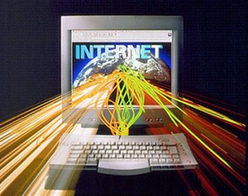雖然具體誕生日期不詳,但是業(yè)界普遍認(rèn)為1969年10月29日是互聯(lián)網(wǎng)真正開始運作的日子。這一天,計算機(jī)科學(xué)家雷納德?克蘭羅克帶領(lǐng)他的團(tuán)隊親眼目睹了他們放在加州大學(xué)洛杉磯分校實驗室的一臺電腦跟幾百英里外斯坦福研究院的另一臺電腦連接并“溝通”的場景。計算機(jī)互聯(lián)網(wǎng)由此誕生。不過這個網(wǎng)絡(luò)的發(fā)展進(jìn)程最初比較緩慢,12年之后,連接入互聯(lián)網(wǎng)的電腦還只有213臺。到了1985年,有1600萬人通過電子郵件互相聯(lián)系;而到了2001年,隨著網(wǎng)絡(luò)瀏覽器的出現(xiàn),使用互聯(lián)網(wǎng)的人數(shù)超過5.13億。如今,全球互聯(lián)網(wǎng)用戶大約有17億。40年前,人們絕對想不到互聯(lián)網(wǎng)會發(fā)展到今天的規(guī)模;而今天的人們也無法預(yù)知未來的互聯(lián)網(wǎng)會是何種狀態(tài)。

|
 |
|
Its exact date of birth is not quite certain but the general consensus is that October 29, 1969 was when it really started. |
Its exact date of birth is not quite certain but the general consensus is that October 29, 1969 was when it really started.
On that day, engineer and computer scientist Leonard Kleinrock and his colleagues watched with excitement as a big grey box was delivered to their laboratory at University of California Los Angeles (UCLA).
The box - the size of a fridge - was then connected with a computer that would make contact with another computer several hundreds miles away at the Stanford Research Institute.
Undergraduate Charley Kline was given the simple job of logging on remotely from UCLA to the SRI machine; his one command was "login".
The first attempt, however, proved too much for the "interface message processor" or IMP for short - the system crashed as young Charley reached the letter "g".
It was a slow build up with, 12 years on, only 213 computers being linked up to the network.
In 1985 things were looking up with 16 million people going on through email.
But it was with the arrival of web browsers that the idea really took off, with more than 513 million people online by 2001.
To date, around 1.7 billion people are connected to the Internet.
And what of the future?
Peter Buckley, author of the Rough Guide to the Internet said "now" is a very exciting time.
"We're on the edge of cloud computing which basically means we're migrating from computer-based programs such as Word and Outlook to Internet-based systems such as googlemail or whoever.
"What it means is that our information is now held in the ether, rather than on the computer. There are security risks of course although the Internet service providers are always working hard to ensure data is protected.
Ruth Barnett, Sky News' Twitter Correspondent says: "It is difficult to predict the future as we have seen so many unexpected innovations already, and surely no one could have realized 40 years ago how substantially it would change the way we live.
"It could become increasingly creative, open and collaborative, or we could become more and more "tethered" to the companies who make the gadgets we use to access it - such as phones or games consoles.
"There'll always be developments hyped as the 'next big thing' from online shopping to Twitter to iPhones. But what I think will endure is the appetite to connect and share information, on the go."
相關(guān)閱讀
調(diào)查:美國年輕人互聯(lián)網(wǎng)使用率不及他國
(Agencies)

(英語點津 Helen 編輯)
